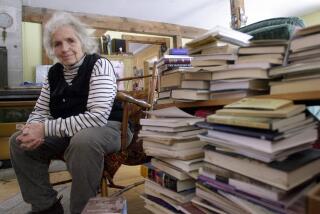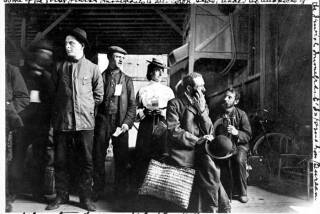The Force of Reason From a Gentle Man
- Share via
Last Sunday, I was privileged to hear Elie Wiesel speak at Temple Bat Yahm in Newport Beach. I was further privileged to have a few minutes of private conversation with him afterward. Such opportunities are rare and perhaps the greatest perk of a job like this.
Wiesel is the Jewish teacher, writer and philosopher who was awarded the Nobel Peace Prize in 1986 for his 30 books and plays that, said the Nobel Committee, made him “one of the most important spiritual leaders and guides in an age when violence, repression and racism continue to characterize the world.”
Wiesel’s message of peace and human dignity took root in the unlikely soil of Auschwitz and Buchenwald, where his parents and sister were murdered by the Nazis.
Wiesel is a slight, almost ascetic man with a forelock of thinning gray hair and the kindest eyes I think I have ever seen. Although his thesis--”what we can learn from the ancient masters”--was directed to a Jewish audience, the questions he raised were universal. And he offered no easy answers, which I found enormously appealing. What a contrast this gentle man offered to the exhortations that we hear so often these days from people who represent themselves as spiritual leaders--and provide us only blacks and whites in a world of gray.
“We must begin somewhere,” Wiesel told his audience, “and that’s why we must court the urge to know. The teacher must always remain a student. To give, he must receive.”
He illustrated his points with funny, self-deprecating little stories. He didn’t tell us what to do. He doesn’t need or use devils in making his points--and if ever anyone could be excused for doing that, it would be Wiesel. He doesn’t rail, he reasons. And humor is never far below the surface.
He talked about the storm that disrupted the Bush-Gorbachev summit in the Mediterranean as God reminding powerful men that “you were going to rearrange the whole world and you forgot about me.”
“There are many voices speaking, if we would only listen. But we’re so taken by what is quick and apparently successful that we forget those who make life meaningful and worth living.”
Although his talk was not political, the first question Wiesel received--and by far the most urgent one from his audience--was how he felt about the impending reunification of Germany. News reports of his speech dwelt almost entirely on his answer to this question--and specifically on the latter part in which he said he is worried that Jewish and American representatives are not part of the reunification talks and that he “would like to see an international conference of scholars in Berlin addressing this question. Indifference worries me more than anything.”
But before he made that suggestion, this man who watched the Germans kill his family and barely survived the death camps himself could say of reunification: “I am ready, I am willing, for many reasons. Whenever freedom prevails, we must be happy. Freedom is an offering, a gift to all people everywhere. When I watched these young Germans breaking down the Berlin Wall, I felt good. But I also felt afraid that we were entering a process that I find dangerous: wiping out memory.”
I talked with Wiesel afterward in the bedlam of Rabbi Mark Miller’s office, and it became instantly clear that if his mind is engaged, he simply shuts out confusion. Two days earlier, he had attended a reception in New York for Czechoslovakian President Vaclav Havel, and I asked Wiesel if he thought it possible for a man of Havel’s intellect and philosophical bent to achieve high office in the United States.
He said: “No, I don’t think it is possible because the system here is very different, very brutal to sensitive people. Especially the primaries. That system requires special people, those who are basically action-oriented. No one has convinced me that those who go through it don’t suffer, too, but they survive. I’m not sure an intellectual could.”
When I asked him if changing the primary system would be enough, he admitted that it wouldn’t. “Intellectuals,” he said, “can and do change ideas and positions, and that is seen as dangerous by many Americans. Also, historically, whenever intellectuals have come to power, they haven’t fared very well.”
He cited the Marxist revolution in Russia as his prime example, but when I pointed out that a substantial group of intellectuals were among the founding fathers of the United States, he agreed quickly and said, “I would like to ponder that question some more.”
There was time, then, to ask him only if he was concerned over the growth of religious and political fundamentalism in the United States. He answered: “Fanaticism is dangerous in any area--including Jewish fanaticism. Fanatics would exclude my right to have an opinion.”
The tide of well-wishers engulfed us then, and I backed off, wondering--and despairing a little--why reason is so hard to come by in this country and why it is so far down the scale of qualities we seem to find attractive for people in public life.
As I edged out of the office, I remembered Wiesel saying: “No person is superior to another, and we all belong to the same family of man. Every individual is responsible for the whole world. The greater the person, the more human the person. We can only survive when we understand that life is sacred and death is not. We must choose life, respect life--anyone’s--for life is the spark of God.”
More to Read
Sign up for Essential California
The most important California stories and recommendations in your inbox every morning.
You may occasionally receive promotional content from the Los Angeles Times.













